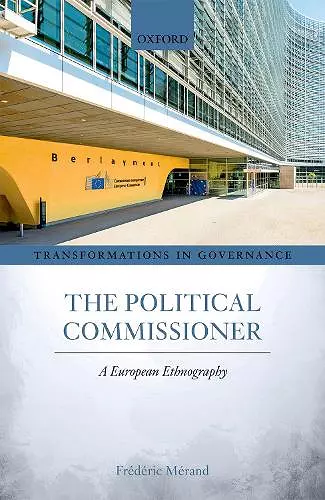The Political Commissioner
A European Ethnography
Format:Hardback
Publisher:Oxford University Press
Published:2nd Jul '21
Currently unavailable, and unfortunately no date known when it will be back

Based on four years of embedded observation in the cabinet of a European Commissioner, this book develops a sociology of international political work. Empirically, it offers an insider's chronicle of the European Union between 2015 and 2019. The analysis traces the successes and failures of Commissioner Pierre Moscovici and his team on five issues that defined European politics between 2015 and 2019: the Greek crisis, budgetary disputes with Spain and Portugal, the rise of populism in Italy, the reform of the eurozone, and the fight against tax evasion. The aim is not to ascertain whether the Commission's policy was good or bad, but to understand how political work is done in a European Union where the 'spectacle of power' is blurred by 24 official languages, 28 national histories, a powerful technocracy, and sometimes opaque institutions. As a life-long socialist politician and former French finance minister, Pierre Moscovici was perhaps the most intensely political character in Jean-Claude Juncker's self-styled 'Political Commission'. Brandishing his leftist identity, rejecting technocratic talk, he surrounded himself with staffers sharing his ambition - but also critical of his actions. Shadowing them from the corridors of the Berlaymont, the seat of the European Commission, to Washington and Athens, The Political Commissioner throws light on the partisan struggles that shaped the Juncker Commission, tensions with the Eurogroup and the Parliament, and recurring conflicts with the Member States. It also shows how political staffers operate informally and in their interaction with the media and civil servants, as they craft and sell public policies to the public. In this ethnographic narrative, French politics is never far away. Decoding the European policy of a French, Socialist Commissioner, first under François Hollande and then Emmanuel Macron, the book investigates the dynamics that sometimes bring Brussels and Paris together, sometimes set them apart. Transformations in Governance is a major academic book series from Oxford University Press. It is designed to accommodate the impressive growth of research in comparative politics, international relations, public policy, federalism, and environmental and urban studies concerned with the dispersion of authority from central states to supranational institutions, subnational governments, and public-private networks. It brings together work that advances our understanding of the organization, causes, and consequences of multilevel and complex governance. The series is selective,...
The Political Commissioner provides a fascinating ethnographic account of how the European Union works at the highest political level. Its rich narrative and insights into everyday EU politics will make it an instant classic. * Rebecca Adler-Nissen, University of Copenhagen *
Too often the Commission is studied as a faceless bureaucracy. In this illuminating and insightful ethnography, Frédéric Mérand reveals the agendas, practices and personal ties that have shaped its politics in a turbulent age. An original and important study. * Jonathan White, London School of Economics *
The Political Commissioner is original, revealing, and exciting. Seeing the cabinet of Pierre Moscovici at work is to get a sense of how Commission officials can exercise a form of political power, as opposed to mere legal or technocratic oversight. At a moment when the European Union is faced with ever more dilemmas and tragic choices, this makes for very timely reading. * Luuk van Middelaar, Leiden University *
How much leeway do EU officials enjoy as they face the Greek crisis or the challenge of eurozone reform? [Frédéric Mérand] addresses this important question through a series of situations and characters that illustrate the fascinating complexity of European integration. * Le Monde *
- Winner of Honorable Mention, European Union Studies Association Best Book Prize.
ISBN: 9780192893970
Dimensions: 241mm x 164mm x 21mm
Weight: 512g
246 pages